- Home
- L. Ron Hubbard
Dianetics: The Modern Science of Mental Health Page 2
Dianetics: The Modern Science of Mental Health Read online
Page 2
“Once aberrative, do not permit as such into computer.” Late areas of “unconsciousness” are impenetrable until early ones are erased.
The amount of discomfort experienced by the patient is minor. He is repelled mainly by engramic commands which variously dictate emotion and reaction.
In a release, the case is not progressed to the point of complete recall. In a clear, fill memory exists throughout the lifetime, with the additional bonus that he has photographic recall in color, motion, sound, etc., as well as optimum computational ability.
The psycho-somatic illnesses of the release are reduced, ordinarily, to a level where they do not thereafter trouble him. In a clear, psycho-somatic illness has become non-existent and will not return since its actual source is nullified permanently.
The dianetic release is comparable to a current normal or above. The dianetic clear is to a current normal individual as the current normal is to the severely insane.
4
Dianetics elucidates various problems with its many discoveries, its axioms, its organization and its technique. In the progress of its development many astonishing data were thrust upon it, for when one deals with natural laws and measurable actualities which produce specific and invariable results, one must accept what Nature holds, not what is pleasing or desired.
When one deals with facts rather than theories and gazes for the first time upon the mechanisms of human action several things confound him, much as the flutterings of the heart did
Harvey or the actions of yeasts did Pasteur. The blood did not circulate because Harvey said it could nor yet because he said it did. It circulated and had been circulating for eons; Harvey was clever and observant enough to find it; and this was much the case with Pasteur and other explorers of the hitherto unknown or unconfirmed. In dianetics the fact that the analytical mind was inherently perfect and remained structurally capable of restoration to full operation was not the least of the data found.
That man was good, as established by exacting research, was no great surprise, but that an unaberrated individual was vigorously repelled by evil and yet gained enormous strength was astonishing since aberration had been so long incorrectly supposed to be the root of strength and ambition according to authorities since the time of Plato.
That a man contained a mechanism which recorded with diabolical accuracy when the man was observably and by all presumable tests “unconscious” was newsworthy and surprising. To the layman the relationship of prenatal life to mental function has not entirely been disregarded since for centuries beyond count people were concerned with “prenatal influence.” To the psychiatrist, the psychologist and psycho-analyst, prenatal memory had long been an accepted fact since “memories of the womb” were agreed to influence the adult mind.
But the prenatal aspect of the mind came as an entire surprise to dianetics, an unwanted and at the time unwelcome observation.
Despite existing beliefs -- which are not scientific facts -- that the foetus had memory, the psychiatrist and other workers believed as well that memory could not exist in a human being until myelin sheathing was formed around the nerves. This was as confusing to dianetics as it was to psychiatry. After much work over some years the exact influence prenatal life had on the later mind was established by dianetics with accuracy. There will be those who, uninformed, will say that dianetics “accepts and believes in” prenatal memory.
Completely aside from the fact that an exact science does not “believe” but establishes and proves facts, dianetics emphatically does nor believe in “prenatal memory.” Dianetics had to invade cytology and biology and form many conclusions by research; it had to locate and establish both the reactive mind and the hidden engram banks never before known before it came upon “prenatal” problems. It had been discovered that the engram recording was probably done on the cellular level, that the engram bank was contained in the cells. It was then discovered that the cells, reproducing from one generation to the next, within the organism, apparently carried with them their own memory banks. The cells are the first echelon of structure, the basic building blocks. They built the analytical mind. They operate, as the whip, the reactive mind. Where one has human cells, one has potential engrams. Human cells begin with the zygote, proceed in development with the embryo, become the foetus and finally the infant.
Each stage of this growth is capable of reaction. Each stage in the growth of the colony of cells finds them fully cells, capable of recording engrams. In dianetics “prenatal memory” is not considered since the standard banks which will someday serve the completed analyzer in the infant, child and man are not themselves complete. There is neither “memory” or
“experience” before the nerves are sheathed as far as dianetic therapy is concerned. But dianetic therapy is concerned with engrams, not memories, with recordings, not experience, and 5
wherever there are human cells, engrams are demonstrably possible and, when physical pain was present, engrams can be demonstrated to have been created.
The engram is a recording like the ripples in the groove of a phonograph record: it is a complete recording of everything which occurred during the period of pain. Dianetics can locate, with its techniques, any engram which the cells have hidden, and in therapy the patient will often discover himself to be upon the prenatal cellular time track. There he will locate engrams and he goes there only because engrams exist there.
Birth is an engram and is recovered by dianetics as a recording, not as a memory. By return and the cellular extension of the time track, zygote pain storage can be and is recovered.
It is not memory. It impinged upon the analytical mind and it obstructed the standard banks where memory is stored. This is a very great difference from prenatal memory. Dianetics recovers prenatal engrams and finds them responsible for much aberration and discovers that any longing for the womb is not present in any patient but that engrams sometimes dictate a return to it, as in some regressive psychoses which then attempt to remake the body into a foetus.
This matter of prenatal life is discussed here at length in this synopsis to give the reader a perspective on the subject. We are dealing here with an exact science, precision axioms and new skills of application. By them we gain a command over aberration and psycho-somatic ills and with them we take an evolutionary step in the development of Man which places him yet another stage above his distant cousins of the animal kingdom.
6
INTRODUCTION
The progress of Mankind from the period of savagery to the present is marked with milestones. Conventional history books would have you believe that these milestones are battle monuments or the tombs of great men. Yet there are more important markers of Man’s progress -- and these are New Ideas. Whenever a New Idea has been created, Man’s chances for survival have been improved and the arduousness of his journey away from animalhood is lessened.
There have been numerous New Ideas in the past. To name a few of the more obvious, consider the invention of the wheel, the control of fire, the development of mathematics or even the newest one -- the discovery of the means of atomic fission. Every one of these ideas has altered the progress of Mankind -- sometimes temporarily for the worse, but ultimately for Man’s betterment.
In my opinion DIANETICS is worthy of being called a New Idea, and is destined to take its place alongside of these other milestones of progress. It might even be considered to be more important than any of these, for it is a science which for the first time gives us an understanding of the tool with which these other inventions were created -- the human mind.
In the creation of any New Idea, there is one step which is highly important. It is so obvious as to be frequently overlooked. This step, the sine qua non of any idea, consists in examining the basic assumptions of the subject and determining whether or not they need to be revised. The creator of a New Idea asks, “What would happen if I assume that this belief which everyone has had for centuries isn’t necessarily so?”
The primitive man who invented the wheel did just that. His fellows assumed that, when one wanted to transport an object, it had to be carried or dragged along the ground. The inventor changed the assumption -- and the wheel was born.
Again, so long as man assumed that fire was dangerous and should be avoided, he made no attempt to control it. When some brave soul re-examined this assumption and decided that fire, although it entailed some hazards, might offer certain advantages to the dwellers in his cave, he took the first step toward the creation of the science of chemistry and nuclear physics.
So it is with DIANETICS. In it there has been a reexamination and a re-evaluation of numerous basic assumptions regarding the functioning of the human mind.
The originator has had both the temerity and the wisdom to refuse to accept all of the old assumptions.
For example, we have all assumed that when a person is unconscious, he is unconscious -- that’s all there is to it. The originator of dianetics was critical of that assumption and, as a result, was able to demonstrate that the mind is never totally unconscious. The assumption that nobody can remember anything which happened to him before the age of three or four also came in for consideration -- and the result of these and other reassessments was DIANETICS.
Yes, basic assumptions are important. They are especially important when they get such a strangle-hold on our ways of thinking that we can’t get away from them. For hundreds of years it was assumed that the sun and the planets revolved around the earth; it was not until the assumption was tested and found to be faulty that modern astronomy was able to develop.
For hundreds of years a certain group of philosophers and religionists have assumed that Man is fundamentally evil; now comes DIANETICS to test this assumption. It will be highly interesting to see if there will be any change in our interpersonal relationships as a result of a new, different basic assumption.
7
The basic assumption is also a long-lived brute, hard to kill. Perhaps one reason for his hardiness is that he feeds upon Authority. There is a vast difference between Authority and an authority. An authority might be described as a man who propounds a basic assumption which is valid for his time and applicable to the state of knowledge at the time it was propounded and has had his ideas accepted. No doubt this man would not be at all averse to altering his assumptions if a change in knowledge warranted it. His protagonists and disciples don’t seem to act this way, however; before very long they begin to treat his idea as if it were some sort of divine revelation -- and the man now becomes an Authority.
The words of an Authority carry much more weight than do those of a mere authority.
They are sacrosanct, holy, not to be questioned; the words themselves are Authority. And, in time, another change occurs; Authority becomes confused with knowledge and is accepted blindly, unthinkingly. A man can even become an authority himself by knowing a great deal about the things Authority said.
Perhaps the epitome of this sort of foolishness is exemplified in the attitude of numerous doctors toward the work of Harvey, the man who first described the circulation of the blood. Harvey’s views, even though they were well founded in observation and experimentation, ran counter to those held by his predecessor, Galen, who was the great medical Authority of that day. So great was the controversy that some men took the stand,
“Male errare cum Galen qualm veritam Harveii amplecti.” (“I would rather err with Galen than accept Harvey’s truth.”)
Now, respect for authority is all very well. There are certain brands of authority which we may tacitly agree to accept, such as customs and morals; there are other brands of authority which we may vote to accept, such as our laws. But we should be wary of self-constituted authority, especially the type I have called Authority. We should feel free to examine the basic assumptions of any body of knowledge we wish, without fear of committing lese majeste. If any system of thought is going to wither in the light of investigation, it does not deserve the title of Authority.
The originator of DIANETICS has, without the slightest effort towards being iconoclastic, succeeded in dislodging a good many of our false gods of Authority from their pedestals. perhaps the job wasn’t too difficult -- so many of the idols who bear that name have feet of the poorest sort of clay. Those authorities whose work was sound and valid are still in their proper places in the temple of Knowledge, and will no doubt continue to remain.
In early 1948 I first heard about DIANETICS from a colleague. I studied it, getting reports from others who were familiar with aspects of the therapy. Shortly thereafter I corresponded with the originator of dianetics, which resulted in my traveling East to study with him, and finally, in my experiencing personal dianetic therapy under his supervision.
For the past year I have been practicing DIANETICS on my patients, on my friends, and on my family. For the first time in my life, I’m satisfied that there is a method by which many questions, hitherto unanswerable, can be answered with definiteness and proven correct.
Correct, insofar as the improved health of the patient is concerned. Correct, insofar as his well-being has been implemented by a feeling of security. Correct, insofar as his approach to living has become more advanced, interesting, and productive of growth. To me this correctness is meaningful and worthy of acceptance.
Let me state that this is my opinion. I do not urge you to accept that opinion; I would much prefer that you make your own tests of DIANETICS, carefully, impartially, and arrive at your own opinion. This statement is directed towards doctors in general, psychiatrists, psychologists, psycho-analysts, etc., as well as the layman.
DIANETICS is a science. It has certain laws, and by following these laws we can predict the results which will be obtained under given circumstances. These laws have no exceptions -- or at least, no exceptions have been found. In this respect the laws of 8
DIANETICS are like the law of gravity: if you suspend a mass heavier than air above the ground and then remove the support, it will fall. It won’t fall seventy per cent of the time or eighty per cent of the time; it will always fall. And if it doesn’t fall, we are justified in reexamining the law.
The discovery that engrams (the ability of the cell to record a lasting trace of an event) are recorded on a cellular level when the higher sphere of the mind is “unconscious,”
insensitive, and not recording (as, for instance, in severe injury, delirium, or surgical anaesthesia) and that the recorded engrams then received are highly reactive, portends a new trend for psychological and psychiatric thought and practice. The engram recorded during a period of “unconsciousness” is susceptible to reactivation during future periods of mental anguish. This fact has been found to be a single, direct source of aberrated behavior. Its discovery and isolation with the mechanics of its operation within the psyche, bring new and brilliant light to hitherto obscure phenomena of the mind and its behavior. The engram, hidden beneath unexplored layers of “unconsciousness,” possesses a power of command not unlike that of a hidden and unsuspected monitor upon the conscious mind; it produces effects which are comparable to those of a post-hypnotic suggestion, though in a far more insidious and involved manner and with greater and more tragic effect.
The technique of DIANETIC therapy is basically simple and can be understood and applied to each other by any two reasonably intelligent people after a brief study of this volume, which is the operating manual for therapy. (Dianetic psychiatric treatment of severe derangements is also delineated.) No previous background in psycho-analysis or psychology is necessary. The therapeutic technique offered in DIANETICS is independent of hypnotism or narco-synthesis.
1.
DIANETICS will help you to eliminate any psychosomatic illness from which you may suffer.
2.
DIANETICS will help you achieve at least one-third more than present capacity for work and happiness.
3.
DIANETICS offers to the medical profession, to psychiatrists, to psycho-analysts,
to all who are interested in the advancement of their fellow men, a new theory and technique which makes accessible for therapy diseases and symptoms which hitherto were unusually complex and obscure.
4.
DIANETICS is the most advanced and most clearly presented method of psycho-therapy and self-improvement ever discovered.
At this point, I step out -- the job ahead is yours.
J. A. Winter, M. D.
9
HOW TO READ THIS BOOK
Dianetics is an adventure. It is an exploration into Terra Incognita, the human mind, that vast and hitherto unknown realm half an inch back of our foreheads.
The discoveries and developments which made the formulation of dianetics possible occupied many years of exact research and careful testing. This was exploration, it was also consolidation. The trail is blazed, the routes are sufficiently mapped for you to voyage in safety into your own mind and recover there your full inherent potential, which is not, we now know, low but very, very high. As you progress in therapy the adventure is yours to know why you did what you did when you did it, to know what caused those Dark and Unknown Fears which came in nightmares as a child, to know where your moments of pain and pleasure lay. There is much which an individual does not know about himself, about his parents, about his
“motives.” Some of the things you will find may astonish you, for the most important data of your life may be not memory but engrams in the hidden depths of your mind, not articulate but only destructive.
You will find many reasons why you “cannot get well” and you will know at length, when you find the dictating lines in the engrams, how amusing those reasons are, especially to you.
Dianetics is no solemn adventure. For all that it has to do with suffering and loss, its end is always laughter, so foolish, so misinterpreted were the things which caused the woe.
Your first voyage into your own Terra Incognita will be through the pages of this book.

 Fifty-Fifty O'Brien
Fifty-Fifty O'Brien Villainy Victorious
Villainy Victorious Spy Killer
Spy Killer Ai! Pedrito!: When Intelligence Goes Wrong
Ai! Pedrito!: When Intelligence Goes Wrong The Dangerous Dimension
The Dangerous Dimension Mission Earth Volume 1: The Invaders Plan
Mission Earth Volume 1: The Invaders Plan The Slickers
The Slickers If I Were You
If I Were You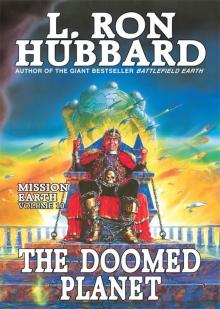 The Doomed Planet
The Doomed Planet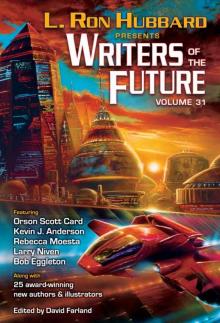 Writers of the Future Volume 31
Writers of the Future Volume 31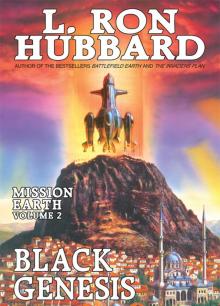 Mission Earth Volume 2: Black Genesis
Mission Earth Volume 2: Black Genesis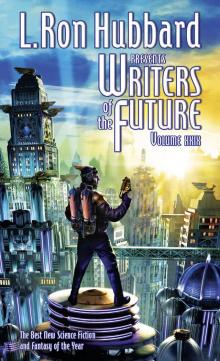 Writers of the Future: 29
Writers of the Future: 29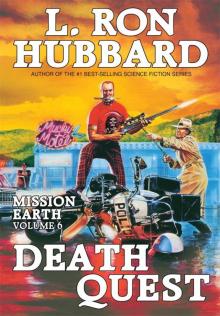 Death Quest
Death Quest The Enemy Within
The Enemy Within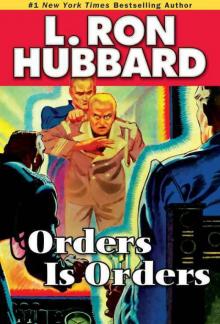 Orders Is Orders
Orders Is Orders Hell's Legionnaire
Hell's Legionnaire L. Ron Hubbard Presents Writers of the Future 34
L. Ron Hubbard Presents Writers of the Future 34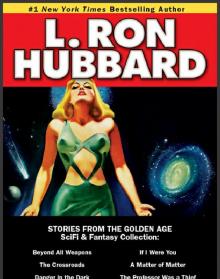 The Scifi & Fantasy Collection
The Scifi & Fantasy Collection Dead Men Kill
Dead Men Kill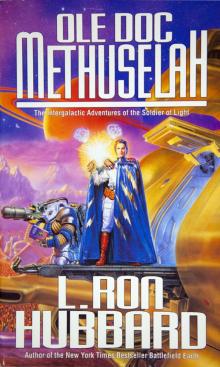 Ole Doc Methuselah: The Intergalactic Adventures of the Soldier of Light
Ole Doc Methuselah: The Intergalactic Adventures of the Soldier of Light Shadows From Boot Hill
Shadows From Boot Hill Hurricane
Hurricane Mission Earth Volume 3: The Enemy Within
Mission Earth Volume 3: The Enemy Within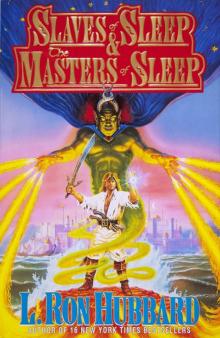 Slaves of Sleep & the Masters of Sleep
Slaves of Sleep & the Masters of Sleep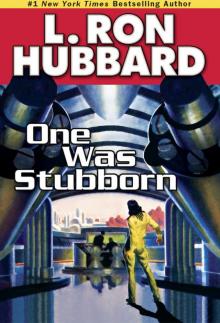 One Was Stubborn
One Was Stubborn Final Blackout: A Futuristic War Novel
Final Blackout: A Futuristic War Novel Devil's Manhunt
Devil's Manhunt A Matter of Matter
A Matter of Matter Voyage of Vengeance
Voyage of Vengeance If I Were You (Science Fiction & Fantasy Short Stories Collection)
If I Were You (Science Fiction & Fantasy Short Stories Collection)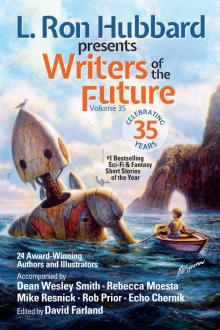 L. Ron Hubbard Presents Writers of the Future Volume 35
L. Ron Hubbard Presents Writers of the Future Volume 35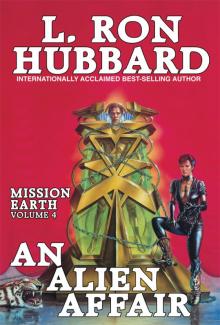 Mission Earth Volume 4: An Alien Affair
Mission Earth Volume 4: An Alien Affair Black Genesis
Black Genesis Tinhorn's Daughter
Tinhorn's Daughter Trouble on His Wings
Trouble on His Wings Writers of the Future Volume 27: The Best New Science Fiction and Fantasy of the Year
Writers of the Future Volume 27: The Best New Science Fiction and Fantasy of the Year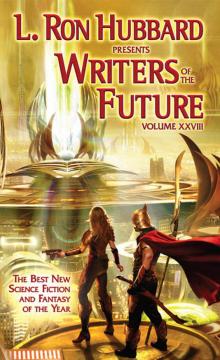 Writers of the Future Volume 28: The Best New Science Fiction and Fantasy of the Year
Writers of the Future Volume 28: The Best New Science Fiction and Fantasy of the Year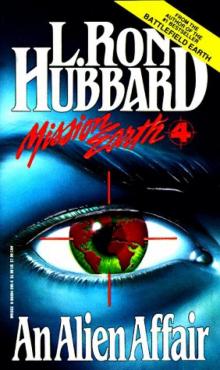 An Alien Affair
An Alien Affair Cargo of Coffins
Cargo of Coffins Mission Earth Volume 5: Fortune of Fear
Mission Earth Volume 5: Fortune of Fear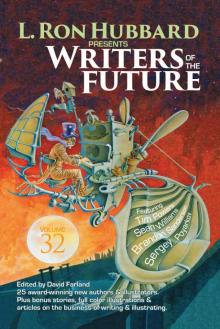 Writers of the Future 32 Science Fiction & Fantasy Anthology
Writers of the Future 32 Science Fiction & Fantasy Anthology The Baron of Coyote River
The Baron of Coyote River Hurricane (Stories From the Golden Age)
Hurricane (Stories From the Golden Age)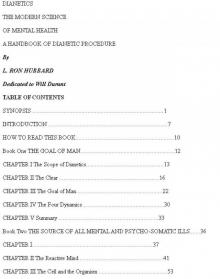 Dianetics: The Modern Science of Mental Health
Dianetics: The Modern Science of Mental Health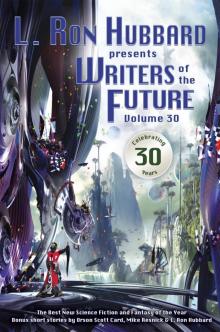 Writers of the Future, Volume 30
Writers of the Future, Volume 30 Battlefield Earth: A Saga of the Year 3000
Battlefield Earth: A Saga of the Year 3000 Fear
Fear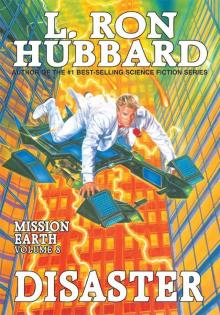 Disaster
Disaster Invaders Plan, The: Mission Earth Volume 1
Invaders Plan, The: Mission Earth Volume 1 A Matter of Matter (Stories from the Golden Age)
A Matter of Matter (Stories from the Golden Age) Writers of the Future Volume 34
Writers of the Future Volume 34 Death Waits at Sundown
Death Waits at Sundown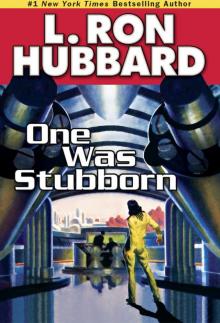 One Was Stubbron
One Was Stubbron If I Were You (Stories from the Golden Age)
If I Were You (Stories from the Golden Age)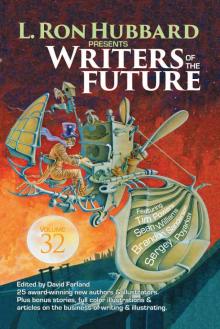 Writers of the Future 32 Science Fiction & Fantasy Anthology (L. Ron Hubbard Presents Writers of the Future)
Writers of the Future 32 Science Fiction & Fantasy Anthology (L. Ron Hubbard Presents Writers of the Future)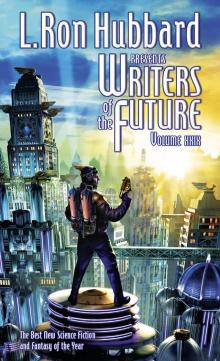 Writers of the Future, Volume 29
Writers of the Future, Volume 29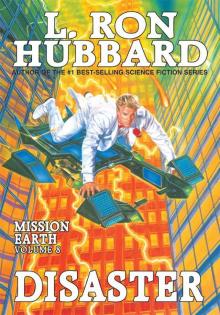 Mission Earth Volume 8: Disaster
Mission Earth Volume 8: Disaster Mission Earth 6: Death Quest
Mission Earth 6: Death Quest Writers of the Future, Volume 27
Writers of the Future, Volume 27 Mission Earth Volume 7: Voyage of Vengeance
Mission Earth Volume 7: Voyage of Vengeance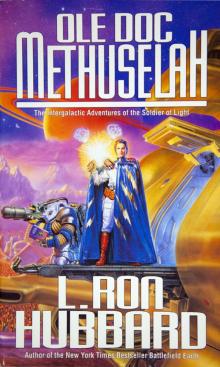 Ole Doc Methuselah
Ole Doc Methuselah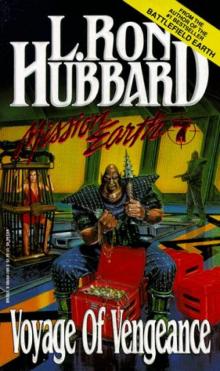 Mission Earth 07: Voyage of Vengeance
Mission Earth 07: Voyage of Vengeance Battlefield Earth
Battlefield Earth Fortune of Fear
Fortune of Fear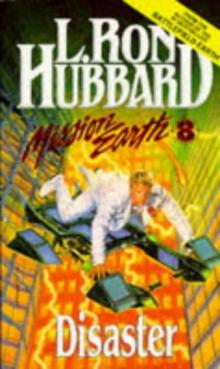 Mission Earth 8: Disaster
Mission Earth 8: Disaster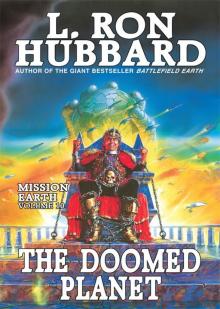 Mission Earth Volume 10: The Doomed Planet
Mission Earth Volume 10: The Doomed Planet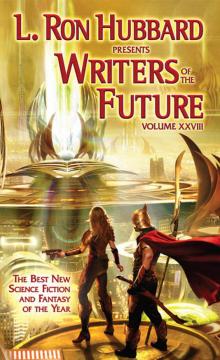 Writers of the Future, Volume 28
Writers of the Future, Volume 28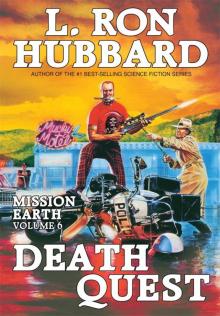 Mission Earth Volume 6: Death Quest
Mission Earth Volume 6: Death Quest Dead Men Kill (Stories from the Golden Age)
Dead Men Kill (Stories from the Golden Age)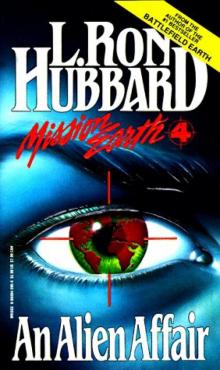 Mission Earth 4: An Alien Affair
Mission Earth 4: An Alien Affair Spy Killer (Stories from the Golden Age)
Spy Killer (Stories from the Golden Age) Mission Earth Volume 9: Villainy Victorious
Mission Earth Volume 9: Villainy Victorious L. Ron Hubbard Presents Writers of the Future, Volume 33
L. Ron Hubbard Presents Writers of the Future, Volume 33